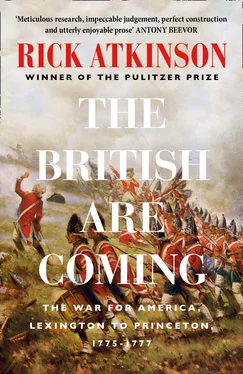Almost fifty sleepy redcoats had surrendered without a fight, as had a smaller detachment at nearby Crown Point. The captured booty included some two hundred iron cannons, ten tons of musket balls, thirty thousand flints, and forty-nine gallons of rum, much of it consumed by those tatterdemalions to celebrate their victory. Two men led the raid in an unsteady collaboration: a strapping, profane, sometime farmer, lead miner, and tosspot philosopher named Ethan Allen and a short, gifted Connecticut apothecary, merchant prince, and hothead named Benedict Arnold, who had been given a colonel’s commission by Joseph Warren and whose long nose and dark hair caused him to resemble a raven in human form. How the captured munitions would be transported from the remote fortress remained to be seen, but no one who knew Allen and Arnold, or knew of them, doubted that both would be heard from again. For now, the “acts of burglarious enterprise,” in one British writer’s description, gave the Americans control not only of Ticonderoga—the most strategic inland position on the continent—but also of the long blue teardrop of Lake Champlain, the traditional invasion route into, or out of, Canada.
Life in besieged Boston grew grimmer by the day. Soon after the fighting began, General Gage agreed to issue exit permits to those who wanted to leave town if all citizens surrendered their weapons at Faneuil Hall. By late April, some 1,778 firelocks had been handed over, plus 634 pistols, 973 bayonets, and 38 ancient blunderbusses. Gage insisted that swords also be added to the pile. “Nearly half the inhabitants have left the town already,” the merchant John Andrews wrote a friend on May 6. “You see parents that are lucky enough to procure papers, with bundles in one hand and a string of children in the other, wandering out of town … not knowing where they’ll go.” Provisions grew short, prices soared, fresh food vanished. “Pork and beans one day,” Andrews wrote, “and beans and pork another.”
Loyalists from the countryside slipped into Boston for Crown protection, then complained bitterly to Gage that allowing all rebel sympathizers to leave would invite bombardment of the town; hostages must be kept to discourage attack. Gage saw the point, and the exodus largely stopped except for those able to sneak out by boat. “It is inconceivable the distress and ruin this unnatural dispute has caused to this town and its inhabitants,” the surveyor Henry Pelham wrote on May 16. “Almost every shop and store is shut. No business of any kind is going on.” A British lieutenant observed after taking a stroll, “I can’t help looking on it as a ruined town. I think I see the grass growing in every street.” More grass was needed: provender for British horses by late May was short by three thousand tons. Warming weather and a diet of salt meat brought widespread illness. Reverend Henry Caner, a loyalist, would write to London, “It is not uncommon to bury 20 to 30 a week among the troops and inhabitants.… If our lives must pay for our loyalty, God’s will be done.” Another loyalist clergyman, Reverend John Wiswall, who took refuge with his family in Boston from Cape Cod, noted in his journal, “My daughter died the 23rd and my wife the 26th. Buried in family tomb the 28th.”
From his Province House headquarters, Gage awaited reinforcements and braced against a rebel assault. Regiments built several small batteries on the Common and a larger redoubt on Beacon Hill. Gunners at Boston Neck were ordered to keep lighted matches by their cannons at all times. Regulars patrolled the wharves every half hour. Loyalist volunteers with white cockades in their hats kept vigil in the streets at night. “We are threatened with great multitudes,” Gage wrote Lord Dartmouth in mid-May. “The people called friends of government are few.” News from the other provinces was bleak. Connecticut, Rhode Island, and New Hampshire were “in open rebellion,” he told London. “They are arming at New York and, as we are told, in Philadelphia and all the southern provinces.” The royal mail was no longer secure; a postal rider with official correspondence from New York had been detained, his locked bag jimmied open with hammer and pliers.
Guard boat crews patrolled the harbor with 6-pounders, alert for fire rafts and often ducking sniper rounds from the far shore. Ships from England no sooner dropped anchor than potshots rang out. “The country is all in arms, and we are absolutely invested with many thousand men, some of them so daring as to come very near our outposts,” Captain Glanville Evelyn wrote his father in Scotland. Morale sank in the regular ranks. A Royal Navy surgeon permitted to treat wounded British captives in Cambridge wrote in May that the rebel army “is truly nothing but a drunken, canting, lying, praying, hypocritical rabble, without order, subjection, discipline, or cleanliness.” A new British drinking song warned:
Boston we shall in ashes lay,
It is a nest of knaves,
We’ll make them soon for mercy pray,
Or send them to their graves.
There would be ashes on May 17. That night, a sergeant in the 65th Regiment reportedly delivered musket cartridges by candlelight to the barracks on Treat’s Wharf; soon after his arrival, a small, accidental blaze grew into a conflagration that burned until three a.m. Gage had placed the town’s fire engines under military control, and inept redcoats, one merchant complained, operated the apparatus “with such stupidity that the flames raged with incredible fury & destroyed 30 stores.” The losses at Dock Square also included regimental uniforms, weapons, and donations collected for Boston’s poor.
Fresh meat for British larders and forage for British horses could be found within a mile or two of Province House, but trouble could be found there as well. In Boston Harbor, more than thirty islands—used for over a century as livestock pastures and hay fields—stippled the narrow, twisting approaches from open water. Shoals, mudflats, salt creeks, and sandbars changed shape with each new tide. Much of the harbor at low water was no deeper than three fathoms—eighteen feet—while the three largest Royal Navy ships on station drew twenty feet or more. American mariners skittered through this watery terrain in smacks, canoes, and whaleboats, trading shots at long range with British foraging parties. On May 21, Gage sent several sloops to Grape Island, but they scavenged only eight tons of hay before rebels burned eighty more.
On Saturday morning, May 27, six hundred Massachusetts and New Hampshire militiamen scuffed from the Chelsea meetinghouse down Beach Road to the shoreline. By eleven a.m., the ebbing tide had fallen enough to let them slosh knee-deep across narrow Belle Isle Creek to Hog Island, where, as ordered by the Committee of Safety, they rounded up 411 sheep, 27 cows, and 6 horses, shooting those that would not be herded. The British were to get none. Thirty men waded across Crooked Creek to adjacent Noddle’s Island, at the confluence of the Charles and Mystic Rivers. At seven hundred acres, Noddle’s was the largest of the harbor isles, once a refuge for Baptist apostates driven from Boston by Puritans, and long a favorite dueling ground for aggrieved parties of all denominations. Here the rebels set fire to a barn piled high with salt hay.
Aboard the fifty-gun Preston in the Boston anchorage, the sight of thick smoke to the east caught the squinting eye of Samuel Graves, commander of the North American station. Graves this very week had received news from London of his promotion to vice admiral of the white; he celebrated with a thirteen-gun salute from his squadron and colors appropriate to his new rank hoisted above Preston ’s deck. A sixty-two-year-old sea dog who had never held high command before arriving in America a year earlier, Graves was a harbor admiral; recovering from a small stroke, he had shuttled between his flagship and a comfortable house on Pearl Street without once in nineteen months venturing out past the Boston lighthouse. His talents were modest—the new promotion notwithstanding—and his grievances many. With thirty vessels in his squadron, but only four substantial ships of force, he was to ensure that Britannia ruled the waves along an eighteen-hundred-mile littoral, from the Gulf of St. Lawrence to Cape Florida. Despite a stupendous increase in smuggling by American insurgents, he admitted that during this past winter “no seizures of any consequence have been made.”
Читать дальше












